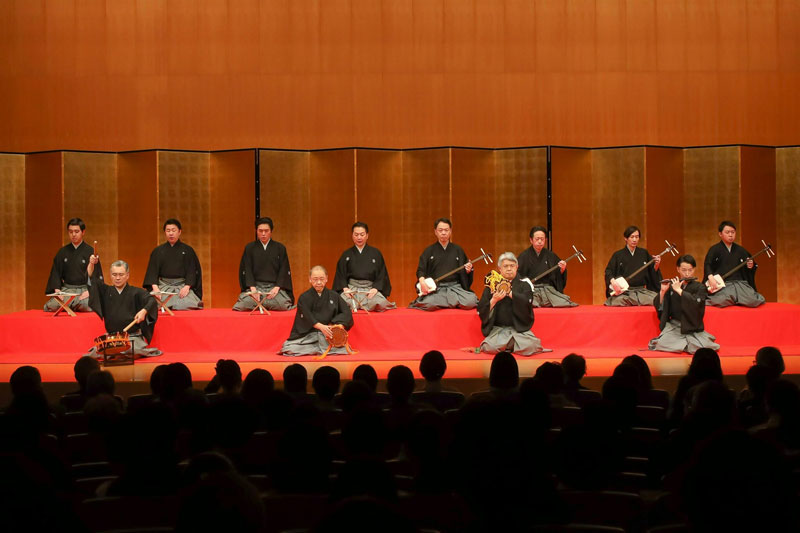
The Music of Kabuki with the Tanaka School
- 3 March 2024
- 15:30 - 16:300
- The Hall, Japan House London, 101-111 Kensington High Street, London, W8 5SA
- https://www.japanhouselondon.uk/whats-on/the-music-of-kabuki-with-the-tanaka-school/
- +44 (0)20 7932 7100
- info@japanhouselondon.uk
- Tweet
Following his visit to the UK in November 2023, acclaimed hayashikata (kabuki musician) Tanaka Denjirō VII returns to Japan House to bring the sounds of the kabuki theatre and to further share his expertise and passion for this artform. This time he is joined by his brother, Tanaka Denzaemon XIII, head of the Tanaka School, and five other established musicians to offer an opportunity for guests to enjoy the mesmerising sounds of kabuki, a rare treat outside Japan.
Kabuki theatre, added to UNESCO’s list of Intangible Cultural Heritage in 2008, originated in the Edo period (1603–1868) from songs and dance performed by female artist troupes. Over time these initially somewhat frivolous shows crystallized into an art offering a visually stunning spectacle with excessively decorative costumes, flamboyant gestures and bold makeup, with all roles now performed by male actors. While kabuki theatre is renowned worldwide for its visual splendour, music and sound are essential components in the artistic expression of this spectacular performing art.
In fact, the role of music in kabuki theatre is vital to the performance. The sound of wooden clappers called ki announces the beginning of the performance and marks its end, prompting the curtain to fall. The rhythm produced by percussion instruments such as kotsuzumi (small hand drums) and taiko drums builds up the tension and serves as a backdrop for various scenes. Vocal music called nagauta, created by the harmony of shamisen (a three stringed musical instrument) and singing, accompanies actors in the dance scenes and functions as a reflective intermission in some plays. Whether present on stage or hidden from spectators’ eyes while performing in the kuromisu (the musicians’ enclosure), hayashikata musicians are indispensable in kabuki performance.
This event offers guests an opportunity to enjoy a selection of classical compositions masterly performed by acclaimed artists from the Tanaka School of Kabuki Hayashi Musicians. It also provides an expert introduction to different genres of kabuki music and its instruments. Audience members will also have the opportunity to ask questions.
Please note that filming and photography may take place at this event. Photos and footage of the event may then be used to promote Japan House London, helping more people to discover what we offer. If you have any concerns, please contact us online or contact a member of the team on site.
About the speakers
Tanaka Denzaemon XIII and Tanaka Denjirō VII are brothers who come from one of the most prestigious families in the Japanese performing arts. Their late father, Kamei Tadao, a drummer of the Kadono School of Noh Hayashi Musicians was a ‘Living National Treasure’ and their mother, Tanaka Sataro IX, serves as the head of the Tanaka School of Kabuki Hayashi Musicians. Together with their eldest brother Kamei Hirotada, they produce and perform as Sankyōkai. They are recognized as Collective Holders of Important Cultural Property.
Tanaka Denzaemon XIII
Tanaka Denzaemon XIII was born in 1976 and began studying under his parents at the age of two. Since inheriting his current distinguished stage name in 2004, he became the 13th head of the Tanaka School of Kabuki Hayashi Musicians. He has also been the CoDirector of Music at the Kabukiza Theatre since 2005 and leads the Kabuki Music Association. Tanaka Denzaemon XIII actively engages in collaborations across various genres, working with such prominent figures as stage directors Noda Hideki and Ninagawa Yukio. His international kabuki tours include performances at the National Theatre (London), Palais Garnier and Palais de Chaillot (Paris), and Lincoln Center Festival (New York). In the opening ceremony for the 2020 Summer Olympics, he performed in Ichikawa Ebizo XI’s kabuki excerpt Shibaraku.
Tanaka Denjirō VII
Tanaka Denjirō VII was born the youngest of three brothers in 1977 into a family with strong musical traditions. He made his stage debut at the age of three in the Noh play Tamuraand assumed his current stage name in 1994. He has performed on various prominent kabuki stages across Japan as well as overseas in London, Paris, New York, Singapore, and Rome. Apart from performing in staged productions, he actively engages in composing music for new and revival kabuki repertoires.
Booking Essential | Admission Free
